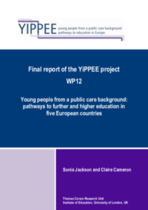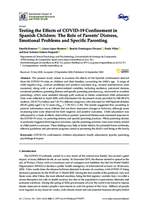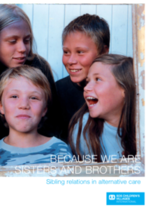Displaying 1 - 7 of 7
… foster carers are volunteers who receive an allowance (to cover the child's expenses), except for specialised foster … foster carers are volunteers who receive an allowance (to cover the child's expenses), except for specialised foster …
… in England, and even widening the inclusion criteria to cover compulsory school years produced very few studies … care and there is therefore an insufficient number to cover real demand. Kinship care has also increased in … limited (Vinnerljung 1998). However, national registers cover the entire population. The data collected in these …
… offer the guiding logic for such national strategies to cover: • Access to adequate resources • Access to affordable … 2021. • Families of eighth graders will receive BGN 250 to cover part of the expenses for the beginning of the new … for paid sick leave. Sickness benefit was extended to cover the first three days of sick leave, which was not …
… administration should provide such supports in order to cover their specific academic needs. If not, it could put … administration should provide such supports in order to cover their specific academic needs. If not, it could put …
… A plethora of constructs have been suggested to cover those variables that protect from life stressors, for … some of the analyzed variables were created ad hoc to cover the specific needs of the research on the COVID-19 … A plethora of constructs have been suggested to cover those variables that protect from life stressors, for …
… Cornelia Bolter, Simone Rechfelden, Johanna Romillo COVER PHOTO: myriam Sterenberg PHOTOS: Alexander Gabriel (3), … closer sibling relations are and the more functions they cover, the higher the conflict poten- tial seems to be. … Cornelia Bolter, Simone Rechfelden, Johanna Romillo COVER PHOTO: myriam Sterenberg PHOTOS: Alexander Gabriel (3), …
Background:
Recent international research has warned of the impact of the COVID-19 lockdown on vulnerable children. However, little is known regarding the in-care population. Objective: To find out how children in residential care perceived the influence of the COVID-19 lockdown in their everyday life, relationships and subjective well-being. Participants and setting: 856 children from 10 to 17 years old (Mage = 15.5, males = 71.2%, females = 28.8%) living in residential centres in Catalonia.
Methods:
Cross-sectional study. Children responded to an…







